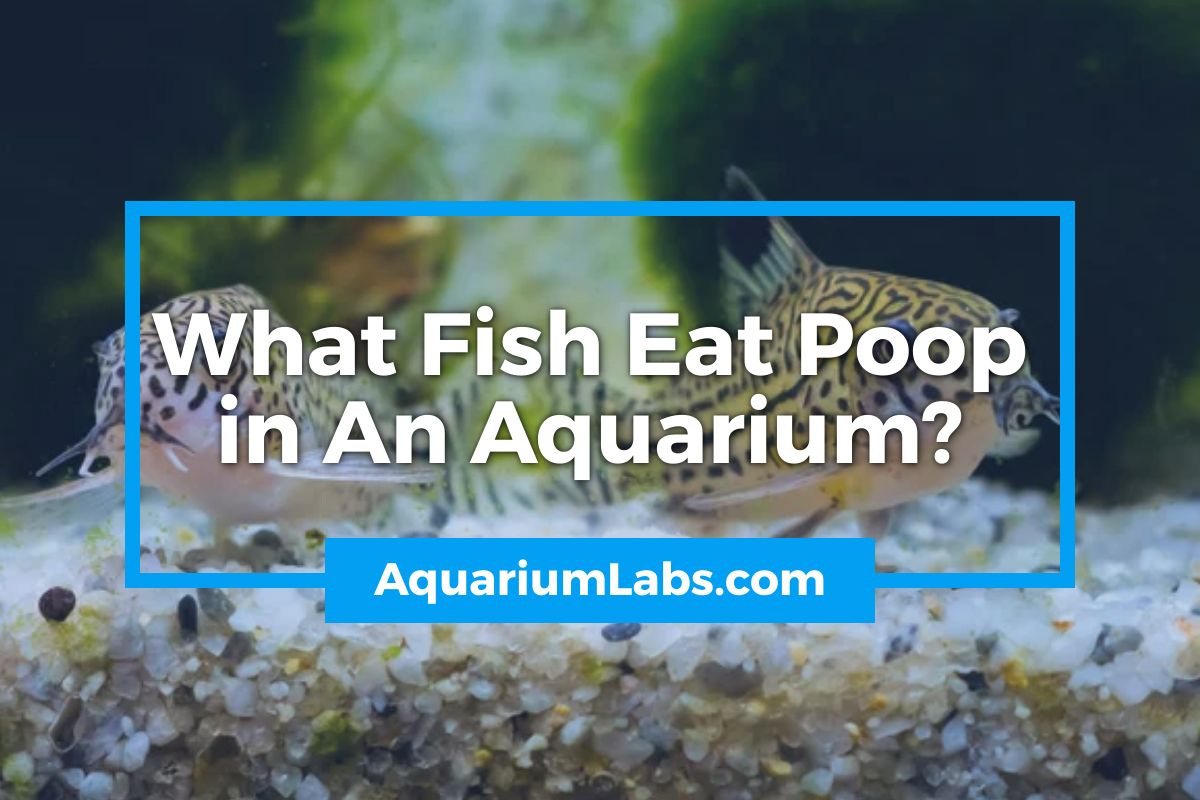Fish poop is a hot topic when people are thinking about setting up a brand new fish tank. Because what goes in must come out, and that includes fish food. Fish waste is released into the water and quickly floats down to the bottom.
But what happens then? Does it need to be removed somehow? Or are there poop eating fish or other animals that eat fish poop we can rely on to help keep up fish tank healthy?
What Kind of Fish Eats Poop?
First off, we have some bad news. There aren’t any aquarium fish that eat poop. All the poop your pets create is not going anywhere. It would be so convenient if that were not the case. This is why a few common bottom-dwelling fish are sold to beginning fish keepers as poop-eating fish.
Are Plecostomus or Corydoras Poop Eating Fish?
The two aquarium clean-up crew members you most commonly see added as tank mates are plecostomus and corydoras. Plecostomus are often sold as suckerfish, suckermouth fish, or simply “algae eaters.” While Corydoras come in dozens of different species with different names.
Plecos are useful clean-up crew members because they do eat the algae growth that constantly exists in a healthy fish tank. They also chew on all the organic leftovers that accumulate, such as dead plant debris, biofilms, leftover food, and mulm. But eating poop is not something a pleco will do.
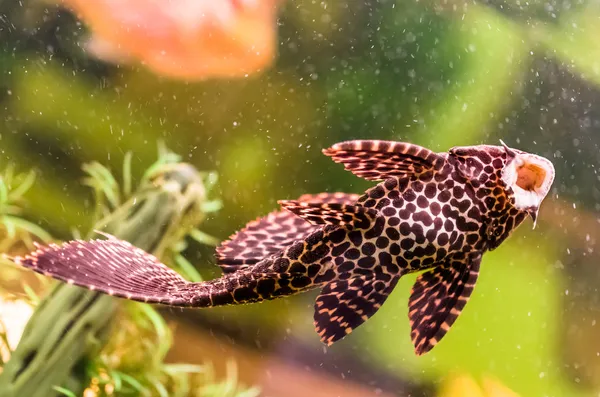
Cory fish eat leftover or uneaten food that falls to the bottom. But these bottom feeders are carnivorous and prefer flakes, shrimp pellets, and other protein-rich goodies, not algae or other debris. And they certainly won’t eat other fish’s waste like fish poop.
In fact, you should not force either these freshwater fish to eat only leftover fish food or algae. Plecostomus grow up to 2 feet long and need plenty of vegetable matter, algae wafers, and other food additions per day to remain healthy. Making them only eat leftover food is a good way to starve them long before they reach their full adult size.
Are there Any Other Fish that Clean the Tank?
Many other fish will hunt for organic waste like leftover food and algae. Goldfish, barbs, redtail sharks, and catfish will all feed along the bottom. But none of these fish will do the job of removing fish poop for you.
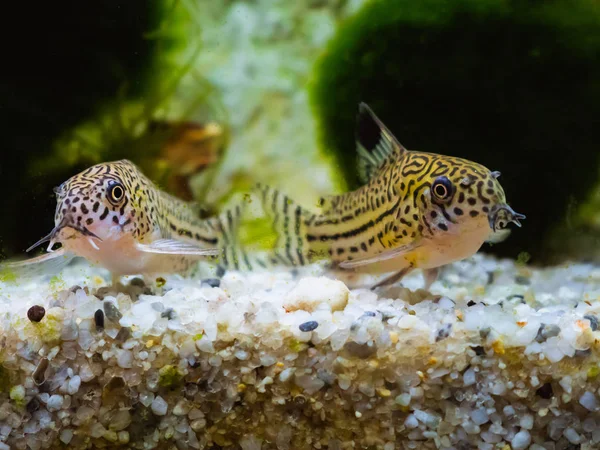
These fish are omnivorous, which is one reason why people often think they will eat poop. As omnivores, these fish enjoy both plant and animal matter. But they usually eat snails, algae, soft-leaved plants, worms, fish eggs, and so on. A little bit of everything, but they certainly don’t eat fish poop.
There are fish that will clean up other kinds of organic debris, however. Dwarf Otocinclus are fascinating fish for smaller tanks that need a little algae control. These fish absolutely love eating the green algae that grows on live plants. And since they are so small, Dwarf Otocinclus are much more delicate when they remove algae. They won’t damage plant leaves while grazing like larger Plecos sometimes do.
Will Snails and Shrimp Eat Fish Waste?
Snails and shrimp are very good additions to an aquarium cleanup crew. They help improve tank health by finding and consuming any leftover food before it can rot and produce harmful chemicals. Many also love grazing on green algae that grow on every surface.
Sometimes you might see a shrimp pick up and start eating poop. But fish poop has no nutritional value; the shrimp is just exploring the organic matter that builds up along the bottom of a tank, looking for any potential nutrients. But more than likely, the shrimp will eventually drop the piece since they don’t usually eat fish poop.
If you want to try keeping snails and shrimp to help keep your tank clean of organic waste, then I highly recommend it. Just make sure that your water quality is always top-notch. Invertebrates are a little more sensitive than freshwater fish to toxic ammonia and other waste products. Even moderate levels of nitrate and other chemicals can be fatal to freshwater shrimp.
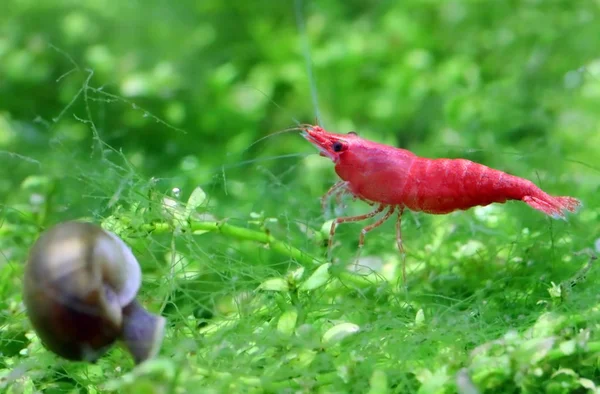
Also, you should only keep shrimp and snails with small to medium-sized fish. Many fish find invertebrates to be delicious, especially shrimp.
Some good shrimp species to consider that love eating algae include Glass or Ghost shrimp and Amano Shrimp. Red Cherry Shrimp and Crystal Bee Shrimp are as beautiful as any marine reef shrimp. But they prefer feeding on bacterial biofilm and leftover food rather than algae.
Most snails are more than willing to eat leftover food and algae as well. But be careful when adding species like the Ramshorn Snail. Many will reproduce very quickly and can have hundreds of babies in a very short time.
The Nerite Snail is a favorite algae-eating snail of ours because the adults live in freshwater, but they require brackish or saltwater in order to breed. So any eggs they lay will never multiply into an invasion of pest snails. They also happen to be very beautiful and interesting in their own right!
How Do I Get Rid of Fish Poop in My Tank?
Since your aquarium residents won’t remove fish poop for you, it is all up to you! Fortunately, purging waste products is not too difficult to do. But it does mean setting up a regular vacuuming schedule for your tank.
An aquarium siphon hose is the tool of choice for most fish keepers. They look similar to a vacuum cleaner and actually operate similarly in some respects. During a tank clean, an aquarium siphon hose uses water flow for cleaning poop and removing water with dissolved waste products.
Usually, when removing fish poop, you send this old water into a bucket for disposal. But if you have a tool that connects directly to a faucet, you can send dirty water right into the drain. These tools can then be reversed, sending clean tap water back into your fish tank.
Just make sure that you take a moment to match the aquarium’s water parameters as closely as possible. The water temperature is the main parameter to watch out for since water that’s very hot or very cold can shock your aquarium fish. And, of course, you should be using a tap water dechlorinator to detoxify the chlorine and chloramine that municipal facilities add to drinking water.
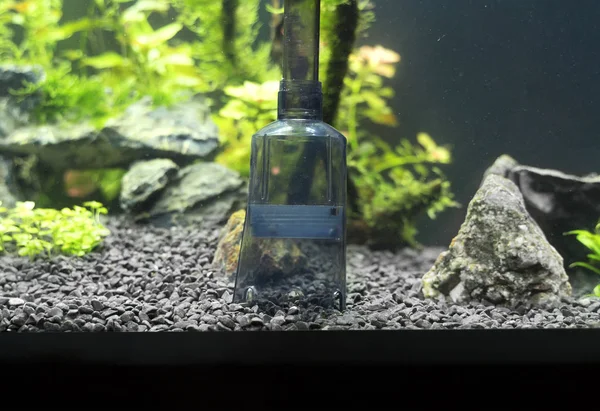
Why is Fish Poop Bad for Aquarium Fish?
Fish waste of all kinds (including fish poop) is inevitably going to build up in an aquarium over time. As fish eat, they process the food they take in and release fish poop into the water.
The more waste product that builds up, the worse the water quality will become. Fish poop isn’t much of an ammonia source – at least not at first. Fish actually release nearly all of their ammonia through their gills or as urine into the water.
However, as fish poop starts to decay, it can be broken down into ammonia. Carnivorous fish poop is especially rich in protein and tends to result in ammonia levels rising faster than the poop of plant-eating fish.
As this ammonia gets released into the water, the beneficial bacteria that live in a fully cycled fish tank take action. These bacteria love ammonia and eat it, releasing nitrite in exchange. Nitrate is not as toxic as ammonia – but it is still not great for tank health.
Fortunately, a second set of beneficial bacteria eats nitrite, converting it into nitrate. Nitrate is not very toxic and can be tolerated by fish at pretty high levels until you remove it with a gravel vacuum during an aquarium water change.
In case this feels like a little too much chemistry for you, don’t despair! Here is an easy-to-follow video breaking down what the aquarium nitrogen cycle is and why it matters for fish and tank health.
What Happens If I Don’t Reduce Fish Poop Amounts?
No one goes around with a turkey buster or gravel vacuum in nature to clean fish poop up, right? So why do you need to remove it and other debris for good tank health?
Well, any aquarium is massively overcrowded compared to nature. The huge volume of water compared to the fish living in it makes any waste they release negligible. We also have the bacteria, plants, and other organisms that all work to maintain proper water quality for all organisms.
An aquarium filter helps remove fish poop and fish waste as well. Aquarium plants are also helpful if you have lighting bright enough for them. Aquarium plants grow by consuming nitrogenous waste like ammonia and nitrate.
Can Fish Poop Be Good For An Aquarium?
Believe it or not, fish poop is not all bad. No fish eat poop, but aquarium plants are a very different matter. Plants don’t “eat” in the usual sense. But they do rely on animals for nitrogen products like ammonia and nitrate. And fish poop does provide nitrogen as it decays through bacterial action.
Once the organic matter is depleted, fish poop becomes part of the mulm or detritus that exists in any ecosystem. This debris will continue to slow-release nutrients as bacteria and fungi work at it over long periods.
Broken-down fish poop also becomes an organic addition to the soil of the environment or the substrate of an aquarium fish tank. This organic matter helps hold onto water and other nutrients that plants need for good growth. So fish poop does serve a purpose. It isn’t great for aquarium fish, but plants do love it!
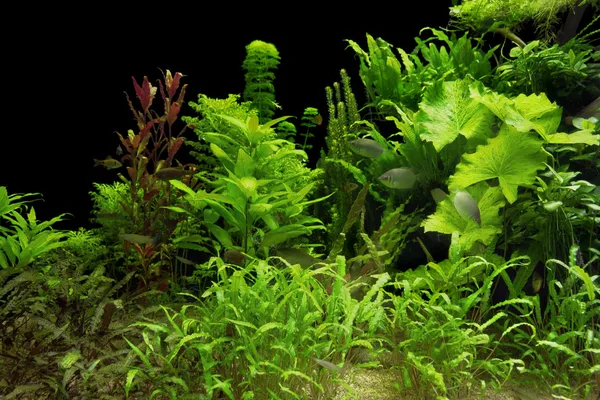
In some extreme cases, fish poop can serve other essential purposes. For example, parrotfish are oceanic wrasses that actually contribute to beach formation. They are specialized feeders of marine algae, but a few also eat living corals.
Coral, as you might know, is mostly made of a rock-hard aragonite skeleton. The actual animal forms a thin protein coating over the stony skeleton. Not too appetizing, one would think.
But parrotfish have hard, bony, plate-like teeth, and they take huge bites out of coral reefs. They crunch up coral, digest it, and release clouds of sand instead of the compacted fish poop you might expect. This sand drifts along and is a major component of tropical beaches. Many people enjoy a tropical vacation on a huge expanse of fish poop without even realizing it.
Here is an interesting video demonstrating how parrotfish turn sand into fish poop!
Do Fish Eat Human Feces?
We’ve established that there are no fish that eat fish poop. But are there fish that eat poop from other animals – or even humans? As it turns out, this does happen in some parts of the world.
Farm-raised fish, especially in Asia where the laws are laxer on what you can feed fish, are sometimes fed poultry, pig, and cow poop. Usually, this isn’t the only thing they are fed, but if food supplies are low, waste products might be offered. It is also a cost-saving measure since few other businesses are all that interested in buying farm waste.
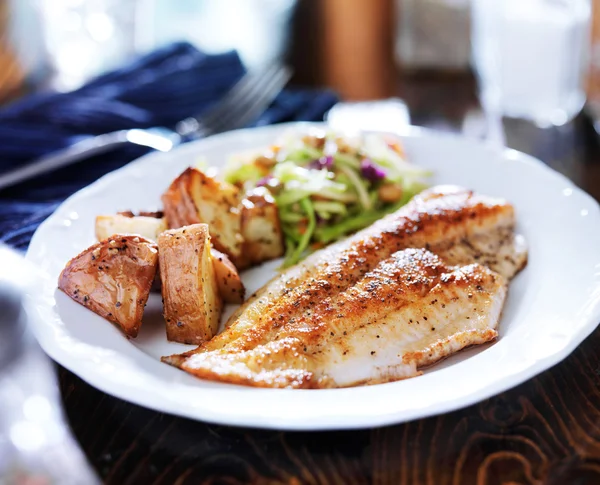
Tilapia, catfish, carp, and other bottom-feeding fish will sometimes eat animal poop. Usually, it is a ground-up mash of feathers, poop, bones, and other refuse. They may even eat human feces, but the dangers of disease are even more dramatic. So there is no chance of you ever buying a fish to eat that has eaten human poop.
Wrapping Things Up
Fish waste is a subject not everyone wants to get too deeply into. But since all fish eat food, poop has to come out the other end. Unfortunately, no fish will eat poop or fish waste. But it’s not very difficult to take care of it yourself.
You won’t get all of the fish waste. But aquarium plants and other organisms don’t mind a little left behind as it makes good organic fertilizer for their roots!
Hopefully, you’ve learned a lot about how to manage fish waste in an aquarium.
Related Reading:
- How Do You Clean Up Poop From Sand?
- Why’s My Tank Get Dirty So Fast?
- How Do You Properly Clean a Fish Tank?
- What Fish Eat Seaweed?
- Can Fish Eat Rice?

